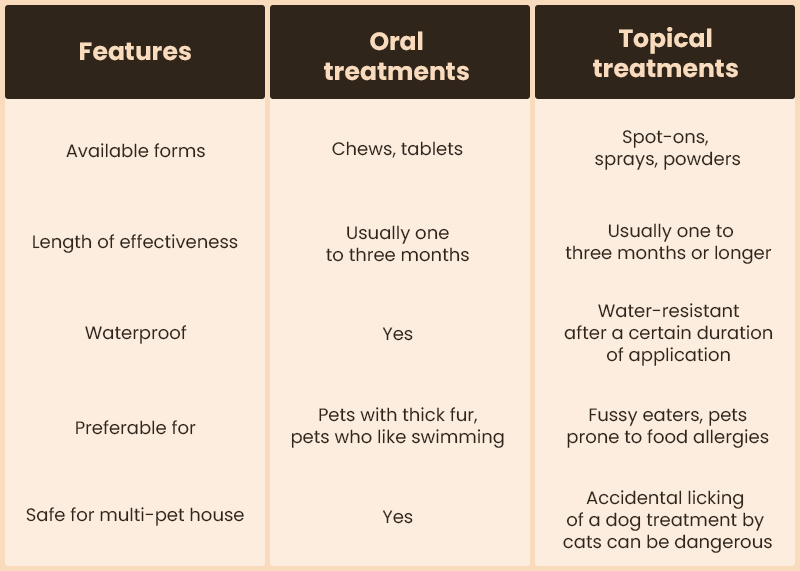
Fleas and ticks are, without a doubt, an unavoidable nuisance for pets. No matter how hard you try to keep your pet protected, these nasty creatures find their way onto your canine or feline friend, even if they stay indoors the majority of the time. This makes the administration of regular flea and tick treatments a necessity for every furry family member. Many times, pet parents get confused about the selection between a topical and an oral parasite treatment. If you are also facing the same dilemma, this piece of writing is for you.
This blog includes information about oral and topical flea and tick treatments and a comparative analysis of both treatment types. Read on to learn everything about it.
Flea & tick treatments for pets
Fleas and ticks feed on their host and reproduce fast, thus spreading the infestation rapidly. Though it may start only with skin irritation and itching, these parasites can transmit various diseases and can compromise your dog or cat’s overall health in many ways. Timely treatment and prevention are, therefore, the most viable ways to keep your pet safe. There are a variety of parasite treatments available. Based on the mode of administration, oral and topical treatments are among the popular ones. Here are the peculiarities of both treatment types:
- Oral flea & tick treatments
Oral parasite treatments are available in the form of chews and tablets. A single dose of the majority of them offers protection for one month. The coverage usually includes killing of existing fleas and ticks, and control of subsequent infestations. Once administered, the active ingredients of these treatments enter your pet’s bloodstream. When a flea or tick bites your pet and takes a blood meal, it ingests these parasiticides and dies as a result. Here is what makes oral treatments a favorable option:
- Oral chews and tablets are available in palatable flavors, which pets accept like a treat, without a fuss. So, they are easy to use and are mess-free.
- Many of the oral treatments also prevent heartworm disease in dogs and cats, thus providing extended parasite protection.
- For ardent swimmers, oral treatment is bliss as there is no fear of washing off the treatment and a reduction in its effectiveness.
- It is a convenient treatment option for pets with thick fur, for whom the topical application will be difficult.
- For a multi-pet house, oral treatment becomes a favorable option as it helps eliminate the possibilities of intoxication due to accidental licking of the solution by other pets.
Treatments like Capstar tablets for cats kill fleas quickly and can be given anytime to eliminate fleas. Similarly, Simparica TRIO chewable tablets provide month-long protection to dogs against fleas, ticks, heartworm disease, and intestinal worms.
- Topical flea & tick treatments
Topical parasite treatments are available in the form of spot-on solutions, sprays, powders, etc. Some of them are effective for one month, whereas some can protect for up to three months. When applied, the active ingredients of these topical treatments get absorbed into the skin and then spread through your pet’s entire body. A few topical solutions provide wider parasite coverage and protect against various internal and external parasites. Here is why topical treatments are a good treatment option:
- Topical treatments are preferable for fussy eaters, who do not tolerate oral administration.
- These treatments kill parasites when they come into contact with the active ingredients. Thus, your pet does not need to take a bite from the parasite.
- Many topical solutions are effective not only on adult fleas, but on eggs and larval stages too, and thus ensure complete parasite elimination.
- For pets prone to vomiting or gastrointestinal upsets, a topical treatment works well as they do not have to ingest anything to get rid of parasites.
Bravecto Topical is one such topical solution that protects dogs against fleas and ticks for up to 12 weeks. Whereas, Revolution Plus is a monthly application that treats fleas, ticks, ear mites, biting lice, and intestinal worms in cats.
Oral vs. topical flea & tick treatments: Comparative analysis
While both oral and topical treatments are effective in reducing and controlling parasite infestations, here is a detailed comparative analysis of both options to help you get the most suitable one for your furry friend:

Also Read: Flea & Tick Treatments (Oral/Topical) or Flea & Tick Collars? Which is Ideal for Pets?
Select the best parasite treatment for your pet
Fleas and ticks often infest pets and make them vulnerable to a variety of health problems, making prompt treatment and parasite prevention a must for all pets. The selection of a parasite treatment that suits your pet depends on their age, breed, lifestyle, the environment they live in, and their health history. While both oral and topical parasite treatments work amazingly in protecting your pet, the selection of one depends on your pet’s health condition and preferences.
If your fur baby is a fussy eater, go with a topical treatment. On the other hand, if your pet likes to play in the water or is not comfortable with messy liquid applications, select an oral treatment.
It is always advisable to consult a veterinarian before preparing a parasite protection program for your furry friend to get a tailored solution. Visit bestvetcare.com to explore an extensive collection of oral and topical flea and tick treatments for dogs and cats, and get everything you need for your pet at incredible prices.
